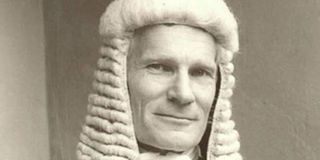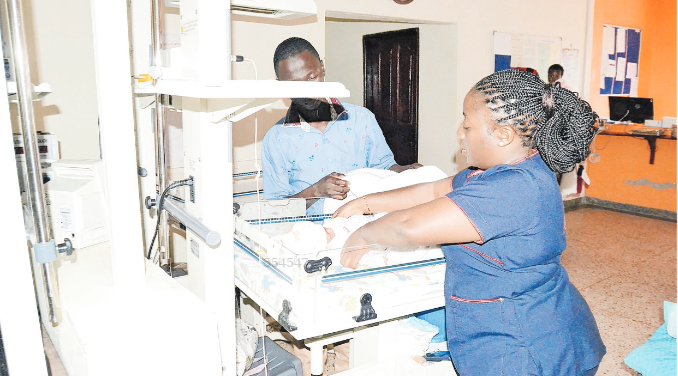Prime
He served as Uganda's president for four days

Sir Peter Allen as Chief Justice of Uganda in 1985. Courtesy Photo
What you need to know:
The former Chief Justice of Uganda recalls life under dictator Idi Amin – and how, for a brief period, he himself ended up serving as President
I left the army in 1955 and travelled by sea to the inland British protectorate of Uganda via Kenya to join the Uganda police.
Uganda is on the equator with Lake Victoria at a height of over 4,000 feet, so it has dry heat with a low humidity. A comfortable climate to live and work in.
In 1956, the Uganda Amateur Boxing Championships took place, the contestants mainly from the police and the army (King's African Rifles). The day before, one of my constables asked permission to bring a visitor, his relative, into the police barracks. He introduced him to me as Sgt Idi, a tall, strong young man, the reigning heavyweight champion (15 years later to be known to us as Field Marshal Idi Amin Dada, Life President of Uganda).
Next evening Les Peach of the police fought him and, after each knocking the other down for partial counts, Peach sent Idi through the ropes for the full count and became the champion.
In 1957, American Vice-President Richard Nixon and his wife visited Uganda while on a whistle-stop tour of Africa. I was then doing a spell as aide-de-camp to the Governor, Sir Frederick Crawford, and we went to the airport to meet Nixon. There was a police guard of honour in full dress uniform but, just as the guard commander brought his sword downwards in the salute, unexpectedly, Nixon stepped forward to shake his hand and thus narrowly missed being sliced in two. Shocked gasps all round.
In 1959, the Queen Mother visited Uganda and on safari she spent a night at Paraa Lodge in the Murchison Falls National Park. Just before dinner the royal butler solemnly announced to Her Majesty that there was an elephant at the door. HM went to investigate and found game rangers shooing away her outsize visitor. It left no message.
Independence came in October 1962 and government departments were rapidly Africanised at the top as British officials left Uganda. I was then at the police college helping to run extra promotion courses to replace departing officers. I elected to stay on, and transferred from the police to the newly formed law school to train magistrates and, later, carefully selected students to read for the English Bar examinations to become advocates and senior magistrates.
After two years I became Principal of the law school and, eventually, we were visited by Lord Justice Diplock, the chairman of the Bar Examinations Board, who later wrote to say that the very high pass rate maintained by our students was far better than they were achieving in London with all their British and overseas students.
In 1969, as a result of shenanigans while I was on UK leave, I lost my job at the law school and was appointed Chief Magistrate and moved to the judiciary.
By 1971, Amin had progressed in the Uganda Army to Colonel, then Brigadier, then Major-General, mainly by locking up or killing the holders of these ranks.
Then, while President Obote was in Singapore attending the Commonwealth Heads of Government conference, a group of soldiers, led by Sergeant-Major Aswa, announced on the radio that they had overthrown the government.
This was because they were dissatisfied with Obote, who was extremely left-wing (he called it Scientific Socialism) and nationalised almost all businesses, which ruined the economy and made life very miserable. They then asked Amin to take over as head of government, which he did. He later dealt with the ministers and politicians who had not fled the country by rounding them up and shooting them.
There followed eight years of extreme unpleasantness, murder and mayhem during which I was appointed a High Court judge and, when I wasn’t in court in Kampala, I was out on circuit in the districts.
In June 1976, Palestinian and German terrorists hijacked an Air France Airbus and brought it to Entebbe where they were welcomed by Amin who provided them with weapons and accommodation and clearly supported their plan to slaughter the 106 Israeli hostages while pretending to the world that he was negotiating their release. Fortunately, the Israeli forces carried out their magnificent rescue raid and we all sighed with relief.
In 1979, the Tanzanian People's Army, with some Ugandan exiles, invaded the south of Uganda and very slowly pursued the fleeing ragbag Uganda Army on foot northwards into the Sudan and the Congo. There was a lot of shooting and much damage done to many buildings.
Amin fled by air to his friend Gaddafi in Libya who soon found that two mad military dictators in one place just doesn’t work, and sent him on to his long-time financial backers in Saudi Arabia. He was given a large house in Jeddah where he remained until he died in 2003 without ever being punished for the genocide of thousands of Ugandans.
In 1985, after several more military coups, I was asked to take over as Chief Justice to sort out the mess in the judiciary. There was yet another coup, this time by rebels causing both the President and the Prime Minister to flee the country. Under the Constitution the number three, the Chief Justice, had to take over until a new President was sworn in.
This meant that I found myself interim President of Uganda for three of four days while I arranged for the successful rebel leader to be sworn in and form a government. Having accomplished this I was then given the boot, and sadly left Uganda after 32 years service.
Sir Peter Allen, who was born in Leicester, England, in 1929, was knighted in 1987. He retired to Cayman where he serves as a member of the Cayman Islands anti-corruption commission. He has published several books about his experiences in Uganda including Interesting Times.
Article first published by The Telegraph




